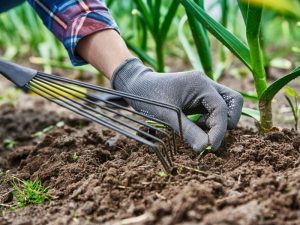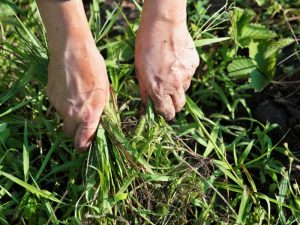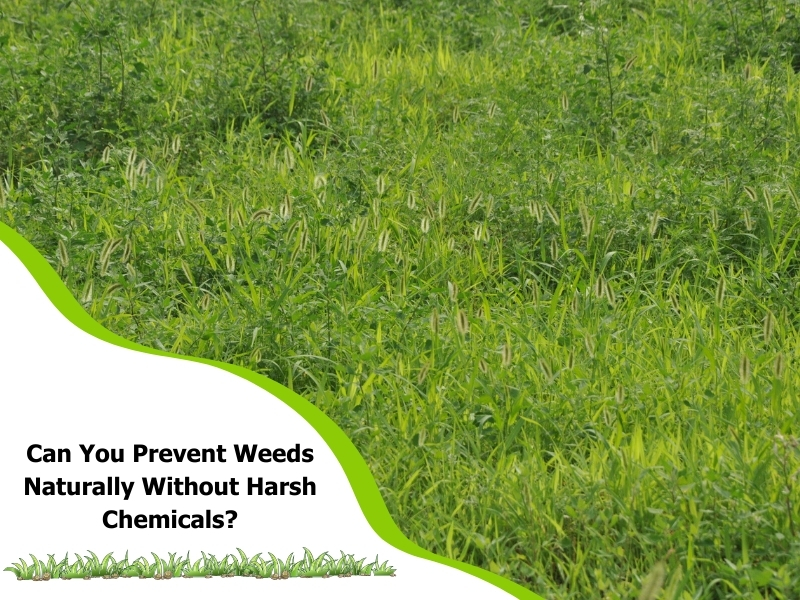Weeds can be a gardener’s nightmare, but you don’t have to rely on harsh chemicals to manage them. With a little effort and the right strategies, you can prevent weeds without chemicals from taking over your garden naturally. From mulching to proper plant selection, there are several effective ways to keep your garden free of unwanted greenery without harming the environment or your health. This article will explore the natural methods that can help you take control of weeds, all while nurturing a healthy, thriving garden.
How can you prevent weeds without chemicals in your garden?
There are several effective, natural ways to prevent weeds in your garden without using chemicals. Here are some top techniques:
- Mulch: Apply a thick layer of organic mulch to suppress weed growth by blocking sunlight and preventing seeds from sprouting.
- Ground covers: Plant ground covers that will shade the soil and limit the growth of weeds.
- Proper planting: Plant your garden densely, as plants that are close together will compete with weeds for space and resources.
- Weed barrier fabric: Use fabric or cardboard as a physical barrier to keep weeds from growing while allowing water and air to reach your plants.
- Regular maintenance: Keep your garden tidy by regularly removing weeds when they’re small before they can spread.
With these methods, you can reduce weed pressure significantly without toxic chemicals. Consistency is key to long-term success in keeping your garden weed-free.
What are the best ways to prevent weeds without chemicals?
The best ways to prevent weeds without chemicals rely on creating an environment discouraging weed growth. Here are the most effective strategies:
Method | How It Works |
Smothering | Use cardboard/newspaper under mulch to block sunlight. |
Hand pulling | Removes weeds at the root to prevent regrowth. |
Companion planting | Grow plants that naturally repel or crowd out weeds. |
Solarisation | Cover the soil with plastic sheeting to kill weed seeds. |
Vinegar solution | Spray weeds with vinegar, salt, and dish soap mixture. |
These eco-friendly methods promote healthier soil and plant growth. While they may take more effort, the results are rewarding for a chemical-free garden.
Why is it important to prevent weeds without chemicals?
Preventing weeds without chemicals is vital for several reasons:
- Healthier soil: Natural methods promote a balanced ecosystem, supporting soil organisms that improve soil health.
- Environmental impact: Chemical weed killers can contaminate waterways, posing risks to wildlife and the environment.
- Human safety: Using natural options like homemade weed killers can reduce exposure to harmful chemicals, but it’s important to use them safely to ensure everyone’s protection.
- Encouraging biodiversity: Natural techniques help beneficial insects, pollinators, and plants thrive.
- Sustainable gardening: Chemical-free methods encourage long-term garden health and sustainability.

By embracing chemical-free weed prevention methods, you improve your garden’s health and contribute positively to the environment.
What role does soil health play in weed prevention?
Soil health is a cornerstone of successful weed prevention. Healthy soil promotes healthy plants that can naturally outcompete weeds. Here’s why soil health matters:
- Improved plant growth: Nutrient-rich soil helps plants grow stronger and more resilient, reducing the risk of weeds taking over.
- Better water retention: Healthy soil holds moisture well, helping plants thrive while weeds struggle.
- Increased soil microbes: Beneficial microbes break down organic matter and outcompete weeds for nutrients.
- Soil aeration: Well-aerated soil promotes deep-rooted plants, making it harder for weeds to take hold.
- Balanced pH levels: Proper pH balance supports healthy plants and discourages weed growth.
Regularly adding compost, mulching, and practising crop rotation are great ways to maintain healthy soil that can naturally suppress weed growth.
Is manual weeding enough to control weeds?
Manual weeding, while effective, is often not enough to control weeds in larger gardens or over time. Here’s why it can be beneficial:
- Effective at early stages: Manual weeding works best when you catch weeds early before they spread and become more difficult to remove.
- No chemicals needed: Pulling weeds by hand avoids the need for chemicals, ensuring your garden remains safe for pets and wildlife.
- Control over weeds: You have control over what is removed, ensuring that only the weeds are removed without harming surrounding plants.
- Physical exercise: It’s a good way to exercise while you garden.
- Labour intensive: Manual weeding requires consistent effort, and if not done regularly, weeds will quickly return.

While manual weeding is a great start, pairing it with other preventive measures like mulching or ground covers will help maintain a weed-free garden in the long run.
Are there eco-friendly ways to remove existing weeds?
Several eco-friendly methods exist to remove existing weeds without relying on harmful chemicals. Some of these include:
- Boiling water: Pouring boiling water directly onto weeds will kill them without affecting the surrounding plants.
- Vinegar: A vinegar solution is an effective natural herbicide that can kill weeds when sprayed directly.
- Corn gluten meal: This natural product prevents weed seeds from germinating, making it an excellent option for both pre-emergent and post-emergent weed control.
- Using mulch: Mulching prevents weed growth and helps maintain a healthier garden. Mulch smothers existing weeds and enriches the soil.
- Flame weeding: A flame weeder uses heat to kill weeds without chemicals, ideal for driveways, walkways, and garden beds.
These eco-friendly methods allow you to control weeds in your garden while keeping your outdoor space healthy and toxins-free.
What should you know about weed management in Sydney’s climate?
Sydney’s climate presents unique challenges when it comes to weed management. Here’s what you need to consider:
Factor | Description |
Mediterranean climate | Warm summers and mild winters allow weeds to thrive. |
Native weeds | Local species adapt well, making control more challenging. |
Watering restrictions | Drought-resistant plants can outcompete weeds. |
Soil quality | Clayey or sandy soils may require tailored weed prevention. |
Rainfall patterns | Extra maintenance is crucial during wetter months. |
Considering these local climate conditions will help you make better decisions about your integrated weed management practices.
How to naturally prevent weeds in different garden areas
Different areas of your garden require specific strategies to prevent weeds naturally. Here are some tips for various garden zones:
- Lawns: Regular mowing, overseeding, and proper fertilisation will help maintain a dense, healthy lawn that naturally resists weeds.
- Flower beds: To control weeds and protect delicate flowers, use organic mulch, ground covers, or raised garden beds.
- Vegetable gardens: Use crop rotation and cover crops to outcompete weeds while improving soil health for your vegetables.
- Paths and driveways: Lay down landscape fabric or gravel to prevent weed growth in areas that aren’t meant to have plants.
Naturally, by tailoring your approach to each garden area with the help of expert garden weeding services, you’ll maximise your chances of successfully preventing weed growth without chemicals.
Keep your garden weed-free, Naturally
Weed control doesn’t have to mean chemical warfare in your garden. You can create a thriving, chemical-free garden using natural methods like mulching, manual weeding, and maintaining healthy soil. Consider getting professional assistance if you’re unsure where to start or need help transforming your outdoor space.
Looking to refresh your outdoor space without breaking the bank? Let A Bargain Gardener bring your vision to life.


